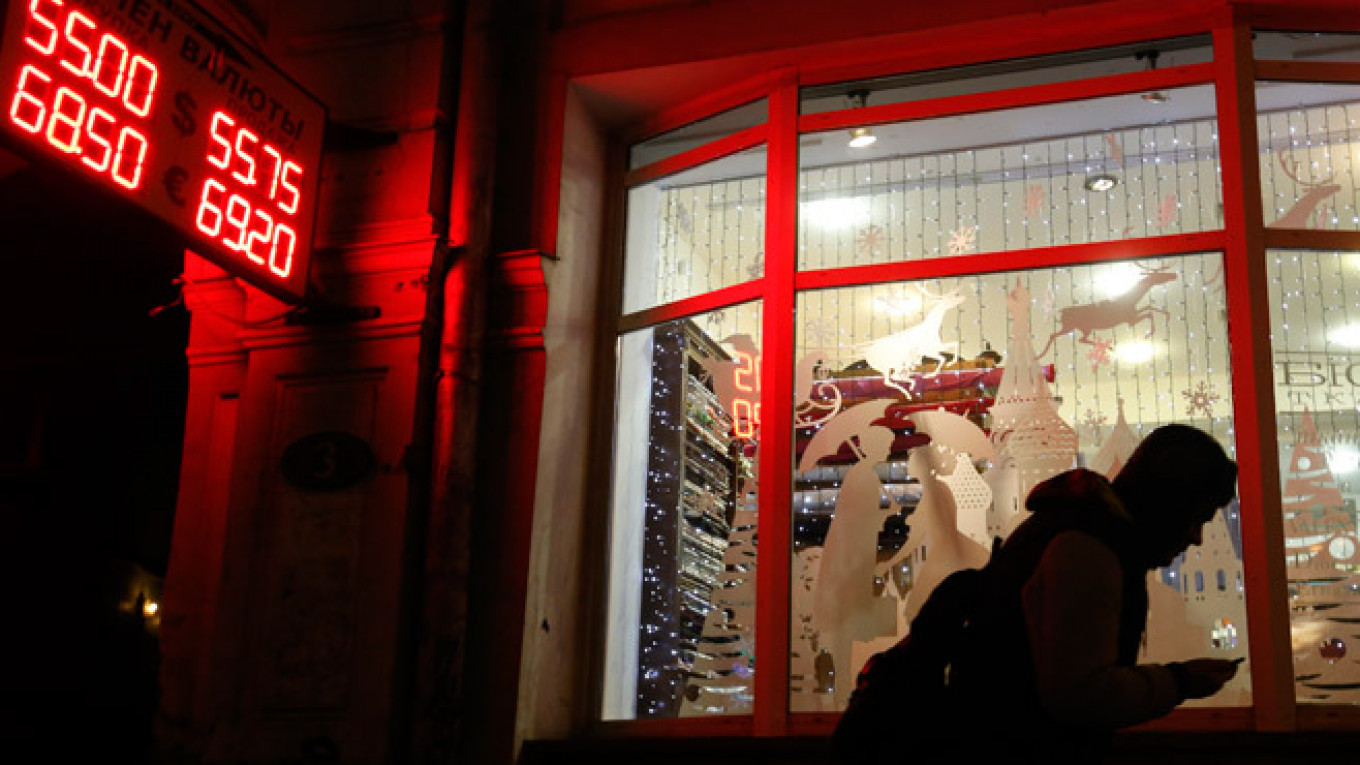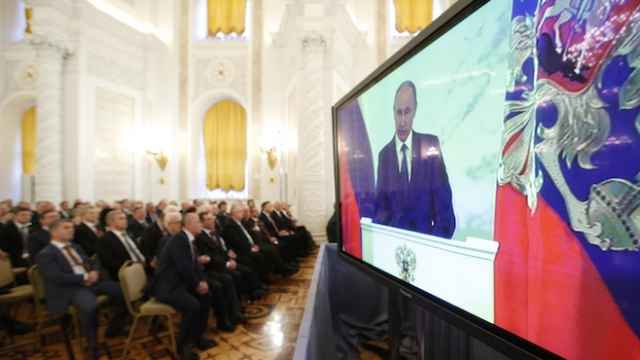The Russian ruble plunged to fresh historic lows Thursday despite a Central Bank decision to raise interest rates in a bid to support the weakening currency and tame rising inflation.
Interest rates will rise one percentage point to 10.5 percent, the Central Bank said in a statement after its final meeting of the year. This is the fifth rate hike since January.
But the move failed to stem the ruble collapse that has gathered pace in recent weeks despite President Vladimir Putin declaring a war on “speculators” and a wave of Central Bank intervention.
The ruble fell to 55.79 against the U.S. dollar in afternoon trading, according to data from the Moscow Exchange. The currency has lost over 15 percent of its value against the greenback in the last two weeks amid falling oil prices and Western sanctions on Moscow for its role backing separatists in Ukraine.
Crisis of Confidence
"The market is becoming much more skeptical that the Central Bank and the government can stop this crisis and there’s a growing sense among market participants that the situation is getting out of control,” Alexei Pogorelov, an economist at Credit Suisse in Moscow, said by telephone.
In a press conference following the interest rate decision, Central Bank chairwoman Elvira Nabiullina said that ruble was undervalued by between 10 percent and 20 percent given the current price of oil, according to the TASS news agency.
“Something akin to a financial bubble is being formed,” Nabiullina told reporters, the RBC newspaper reported.
Central Bank in the Headlights
The Central Bank, which has burned through over $70 billion of its foreign currency reserves this year in defense of the ruble, appears increasingly powerless.
The regulator is like “a rabbit caught in the headlights,” Timothy Ash, an emerging markets analyst at Standard Bank, said in a note to investors Thursday.
Analysts and traders said that the rate hike would have little effect on the exchange rate.
“A one percent difference in the return on an asset doesn’t matter when the chance of it losing all of its value rises dramatically,” Aram Kazaryan, a currency trader at MDM Bank in Moscow said in emailed comments.
Inflation, Recession
The Central Bank's rate rise is aimed at taming inflation, which has gathered pace this year due to the ruble's slump and an import ban on food products from the U.S. and the EU, imposed in retaliation for Western sanctions.
Inflation could reach 10 percent this year but will fall to 4.5 percent in the “medium term,” the Central Bank said Thursday in a press release.
Interest rate rises risk pushing a tanking Russian economy faster towards recession.
The Central Bank said Thursday it expects about 0 percent growth for the Russian economy over the next two years. Other forecasts point to a contraction of up to 3 percent if oil prices remain between $60 and $70 a barrel.
The price of Brent crude has dropped rapidly in recent weeks, sliding toward $64 on Thursday, its lowest level since July 2009.
Political Consequences
The ruble's rapid devaluation has become an acute concern for President Vladimir Putin, who has built his political reputation on delivering economic stability after the turbulent 1990s.
Putin said last week that it was time for the government to punish “speculators” who were deliberately driving down the value of the national currency. While Putin declined to reveal the identities of those manipulating the ruble, economic officials said later that they would be working closely with Russian exporters to manage their currency sales.
Alexander Bastrykin, the head of Russia's powerful Investigative Committee, said Thursday that currency speculation could be made a criminal offense, news agency TASS reported.
Many experts dismiss the impact of so-called speculators on the value of the ruble.
“The market is not subject to speculation, in our view it is real demand,” said Credit Suisse's Pogorelov.
Tumble to Continue
“There is little doubt that all factors weighed together demand a sizable risk premium for the ruble,” said Tom Levinson, a currency strategist at Sberbank CIB in Moscow, in written comments.
Few expect the ruble to strengthen, although analysts said that a higher oil price, large Central Bank interventions or greater foreign currency sales by exporters could trigger a surge.
The nearest psychological target for the ruble is 60 against the dollar, according to MDM Bank's Kazaryan. “I expect more ruble weakness until the end of the year,” he said.
Contact the author at [email protected]
A Message from The Moscow Times:
Dear readers,
We are facing unprecedented challenges. Russia's Prosecutor General's Office has designated The Moscow Times as an "undesirable" organization, criminalizing our work and putting our staff at risk of prosecution. This follows our earlier unjust labeling as a "foreign agent."
These actions are direct attempts to silence independent journalism in Russia. The authorities claim our work "discredits the decisions of the Russian leadership." We see things differently: we strive to provide accurate, unbiased reporting on Russia.
We, the journalists of The Moscow Times, refuse to be silenced. But to continue our work, we need your help.
Your support, no matter how small, makes a world of difference. If you can, please support us monthly starting from just $2. It's quick to set up, and every contribution makes a significant impact.
By supporting The Moscow Times, you're defending open, independent journalism in the face of repression. Thank you for standing with us.
Remind me later.






